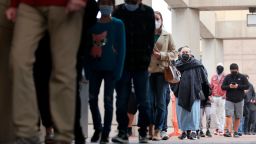Since Covid-19 vaccines became widely available, there has been a wide gap in deaths between the vaccinated and unvaccinated. But recent Covid deaths are much more evenly split as highly transmissible variants take hold, vaccine protection wanes and booster uptake stagnates.
Breakthrough infections have become more common in recent months, putting vulnerable populations at increased risk of severe disease or death as more and more transmissible variants continue to spread. This seems to be especially true for seniors in the United States, who were among the first to get their initial vaccine series.
In the second half of September – the height of the Delta wave – less than a quarter of all Covid-19 deaths were among vaccinated people, federal data shows. But in January and February, amid the Omicron surge, more than 40% of Covid-19 deaths were among vaccinated people.
Covid-19 vaccines have saved millions of lives in the United States since the first shot was administered in December 2020, and the unvaccinated are still far more likely to be hospitalized or die than people who are vaccinated with at least two doses of the Moderna or Pfizer/BioNTech mRNA vaccines or a single dose of the Johnson & Johnson vaccine.
But evidence continues to build around the critical importance of booster shots.
Of those vaccinated people who died from a breakthrough case of Covid-19 in January and February, less than a third had gotten a booster shot, according to a CNN analysis of data from the US Centers for Disease Control and Prevention. The remaining two-thirds had only received their primary series.
Overall, the risk of dying from Covid-19 is still about five times higher for unvaccinated people than it is for those vaccinated with at least their primary series, CDC data shows.
But there’s a significant disparity by level of vaccination, too: When adjusted for age, people vaccinated with only their initial series faced about three times greater risk of dying than those who also have their booster shot.
The CDC encourages people to be “up-to-date” on Covid-19 vaccinations – which includes getting boosters at the appropriate time – but still defines a person to be “fully vaccinated” if they’ve received at least their initial vaccination series.
But this week, a senior Biden administration official was more direct: All adults need a third shot.
Vaccination is the best way for individuals to protect themselves against Covid-19, and protection is most effective with at least three shots, the official said.
Others have emphasized the importance of boosters to save lives, too.
“Almost no one in this country should be dying from Covid” with up-to-date vaccinations and appropriate antiviral treatments, Dr. Robert Califf, commissioner of the US Food and Drug Administration, said Saturday on CNN Newsroom.
“What we really should be worried about is getting the boosters that we need to stay up to date so with the new variants that we have, we don’t have unnecessary deaths and hospitalizations.”
Boosters benefit high-risk seniors most
In the first year of the pandemic, before vaccines were available, the vast majority of Covid-19 deaths – more than 80% – were among seniors age 65 and older.
In 2021, especially during the Delta surge, the average age of people dying of Covid-19 shifted younger. Less than 60% of those who died in September were 65 or older, according to provisional data from the CDC.
But 2022 has looked a lot more like 2020 and the first winter surge; so far this year, about three-quarters of all Covid-19 deaths have been among seniors.
Studies have suggested that Covid-19 vaccine effectiveness wanes over time. Data from the CDC published in January found that getting boosted was 90% effective at preventing hospitalizations during a period when Omicron was the dominant variant. In comparison, getting two shots was 57% effective when it had been at least six months past the second shot.
The vast majority of seniors completed their initial series more than a year ago now. And while booster uptake among seniors is better than other age groups, less than two-thirds of seniors have gotten a booster shot.
The CDC now recommends a second booster shot for this age group, too, and uptake is even lower.
CNN’s analysis of CDC data from recent months suggests that disparities in risk among vaccinated people who are boosted compared with those who only have their initial series are most prominent among this vulnerable age group.
Covid-19 deaths are preventable
Daily Covid-19 deaths in the US have fallen to a fraction of what they were in January and February amid the Omicron surge, but hundreds are still dying each day.
Cases are rising in nearly all states right now, and the White House has warned that another wave in the coming fall and winter could cause 100 million new cases – both raising the potential for more severe disease and tragic loss.
But experts say we have the tools to ensure infections don’t turn tragic.
Get CNN Health's weekly newsletter
Sign up here to get The Results Are In with Dr. Sanjay Gupta every Tuesday from the CNN Health team.
Getting more Americans boosted against Covid-19 could make a big difference as the country heads into the fall and winter, Dr. Peter Marks, director of the FDA’s Center for Biologics Evaluation and Research, said Monday.
“It’s really important that we try to get the half – or a little bit more than a half – of Americans who have only received two doses to get that third dose,” he said. “That may make a difference moving forward here, and it may particularly make a difference now that we’re coming into yet another wave of Covid-19.”
CNN’s Naomi Thomas, Jen Christensen and Elizabeth Cohen contributed to this report




















